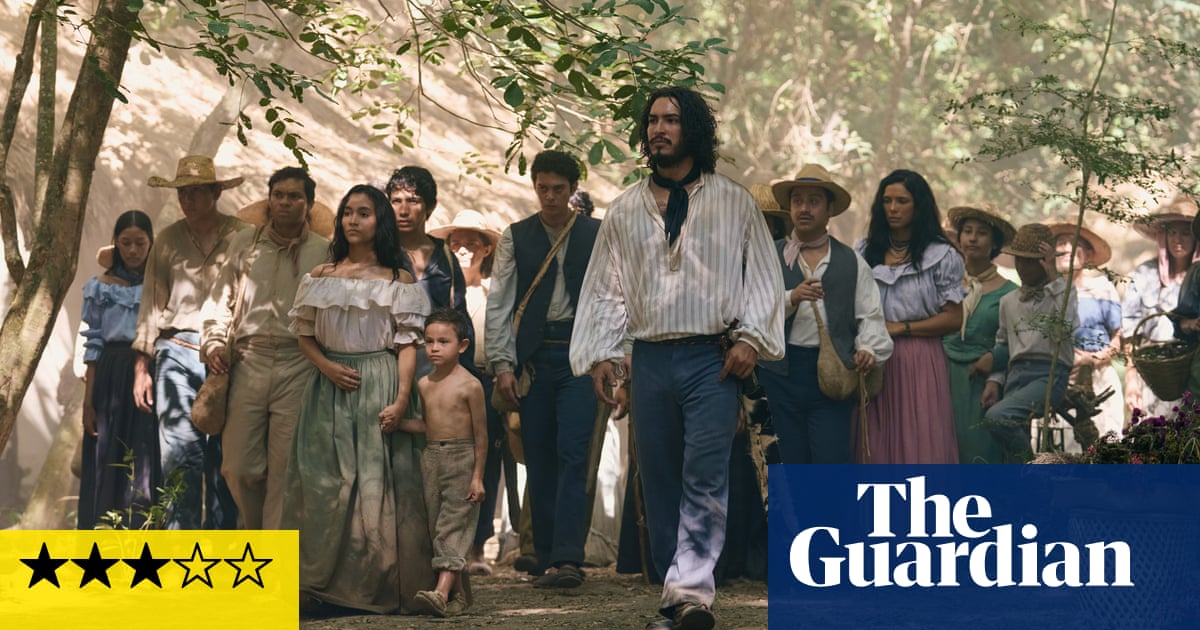Gabriel García Márquez’s 1967 novel is not one to take lightly. Not just a classic but a totem of at least one genre, standing as it does as a high point of magical realism and Spanish-language literature in general, One Hundred Years of Solitude is a big, big book. Netflix is evidently keen not to undercook its dramatisation, made in the novel’s home of Colombia: at 16 episodes, it’s a pretty big TV series.
Márquez’s masterwork is by no means an unfilmable novel, taking place largely in one location and, as it moves through several generations of the same family, telling its story in episodic fashion. Against that is the difficulty of rendering images that were planted in one’s imagination by Márquez’s prose. Devotees of the book might think the pictures on the screen can never measure up, while those sceptical about magical realism – One Hundred Years of Solitude is a work cursed by its own influence, its innovations now cheapened by too many imitators – will be primed to dismiss it as ephemeral, twee or, in its riskier moments, distasteful.
We start in the middle of the 19th century, at the wedding of José Arcadio Buendía (Marco González) and Úrsula Iguarán (Susana Morales). They are cousins, so their union is frowned upon by Úrsula’s mother, who predicts their offspring will have pig’s tails. Stung by this, and feeling unwelcome in their home town on account of José Arcadio being haunted by the ghost of a man he killed in revenge for a disparaging comment made during a cockfight, they pursue José Arcadio’s dream of founding a new settlement: Macondo.
Macondo is an isolated utopia where strange things happen. Priests and babies levitate; the dead choose not to stay dead. A band of gypsies visit annually, peddling such miracles as alchemy, magnets, ice and a syrup that makes you invisible. All are treated as equally plausible. As reality bends around them, the townsfolk often stare impassively across the colourful madness, embracing it and their own eccentricities with the deadpan insouciance of characters in Wes Anderson films. The camera swoops languidly from room to room and house to house, certain that it will find something extraordinary behind every new door.
The curse that says the couple’s inbreeding will produce beasts does not come true, at least not for a long time, but the sons and grandsons of José Arcadio and Úrsula are doomed in another way. They are destined to repeat their own mistakes and those of their predecessors, a problem highlighted by all the males in the family having similar names – a device that is easier to deal with in the TV version, because you can put faces to them rather than riffling back and forth trying to remember who all the various Arcadios and Aurelianos are.
The men tend to be randy daydreamers and the women resourceful realists. Male Macondans’ choices often go beyond the merely eccentric, however, and it’s here the TV show has a problem to solve. The book has a lot of rape and incest, as well as numerous sexual relationships that are, to modern eyes, icky at the very least. Boys become men by sleeping with, or attempting to sleep with, their adopted sister, their aunt, a much younger woman they have pursued since she was a markedly underage girl, and, in the case of both of José Arcadio’s sons, their mum’s best mate, Pilar, a chain-smoking tarot-card reader. On screen all this is toned down a little, although it’s open to debate whether that makes it worse by presenting women being used as a male rite of passage as a relatively normal and benign fact of life.
The show is on firmer ground when politics impinges on the haven of Macondo, bringing with it corruption, civil war and a host of opportunities to reveal hidden cowardice or courage. It’s not yet time for Macondo to become a metaphor for the ravages of capitalist imperialism – the story is split into two parts, with a second batch of eight episodes coming next year. But in the latter part of this first half, the bloody brutality of the war scenes effects a timely shift in tone, just as the soapy family saga is about to repeat itself too many times.
Then there are the pictures that have been in readers’ heads for more than half a century. The rain of yellow flowers announcing the death of José Arcadio, and the trickle of blood impossibly snaking all the way across town to Úrsula’s feet to tell her that her son is dead, are rendered with care and are startlingly beautiful. There’s enough warped wonder here to make Macondo worth revisiting.
skip past newsletter promotionSign up to What's On
Get the best TV reviews, news and features in your inbox every Monday
after newsletter promotion
One Hundred Years of Solitude is on Netflix now
∎